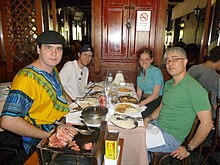WikiWomenCamp/FAQ/Perspectives/Brazil
 Brazil
Brazil
[edit]

Federative Republic of Brazil official language is Portuguese, almost all of the population speaks and is virtually the only language used media. In São Gabriel da Cachoeira where Nheengatu, a currently endangered South American creole language with mostly Indigenous Brazilian languages lexicon and Portuguese-based grammar has been granted co-official status with Portuguese. Brazil is the only Portuguese-speaking nation in the Americas, making the language an important part of Brazilian national identity and giving it a national culture distinct from those of its Spanish-speaking neighbors. Minority languages are spoken throughout the nation. One hundred and eighty Amerindian languages are spoken in remote areas and a number of other languages are spoken by immigrants and their descendants. Brazil is the first country in South America to offer Esperanto to High School students.
- Wikipedia
Portuguese Wikipedia rank 9 out of 280 language Wikipedia. Portugese Wikipedia very active users (more than 100 edits per month) consist of 211 users, and their active users (five edits per month) consist of 1620 users. In December 2011, there were 10,900 people and 5,200 women of all ages from Brazil who were interested in Wikipedia.[1] In December 2011, according to Alexa, Wikipedia was ranked the 17th most popular site in the country.[2] In the period between November 2010 and October 2011, 85.6% of the traffic to Portuguese Wikipedia was from this country.[3] In the period between November 2010 and October 2011, 2.6% of all Wikipedia traffic was from this country.[4] In the period between November 2010 and October 2011, 11.6% of the traffic to Tetum Wikipedia was from this country.[5]. On Portuguese Wikipedia, 29 women transclude the Woman Wikipedia user template on their user page.[6]
- Wikinews, Wikiversity, Wikibooks
On Portuguese Wikinews, there is one woman active on the project of the five total active participants. She represents two countries: Brazil and Portugal. In December 2011, Wikiversity was ranked the 42,550th most popular site in the country.[7]
In December 2011, according to Alexa, Wikibooks was ranked the 2,264th most popular site in the country.[8]
- Other projects
The project has few participants overall, with only 44 users identified as female and 516 identified as male. There are no bureaucrats, male or female, from this country on MediaWiki.Org.[9]
- Brazilian women perspective to free knowledge
- Unknown
- Women in Brazil
Women in Brazil enjoy the same legal rights and duties as men. The law prohibits discrimination based on gender in employment and wages, however there are significant wage disparities between men and women. Many Brazilian women have been elected mayors and federal judges. About nine percent of the seats in the national parliament were held by women. World Economic Forum released a study indicating that Brazil had virtually eradicated gender differences in education and health treatment but that women still lagged behind in salaries and political influence. Women were paid 30 percent less than men. Although there's major participation of women in the elections, the percentage of women who become Federal deputies is still very low, accounting for only 8.8%.
Women already represent more an undisputed majority in many of the college courses. In the areas of Health and Human Sciences, they account for 66% and 71% of all students, respectively. Besides, as a whole, 53% of all Brazilians who are in universities are women. Brazilian women since the 1970s surpassed men in the higher levels education. In 1970, there were approximately 19,000 women professionals in Brazil, including engineers, architects, dentists, economists, professors, lawyers, and doctors. By 1980, there were about 95,800 women in these fields. However, at both the undergraduate and graduate levels, psychology, literature, and arts classes are composed almost entirely of women, in contrast to agriculture and national defense courses, in which extremely low numbers of women are enrolled.
There are serious and controversial issues about differences in the situation of women with different races and ethnicities in Brazil. As a whole, black and Amerindian women enjoy considerably less quality of life than white women, but this reflects the general characteristics of the social and economic gap that has separated social classes in Brazil for centuries, thus not indicating any specific problem about gender and women's rights.
- The Foundation
Since 2010 The Foundation launched Brazil Catalyst Project and hired several consultants to handle this as part of Global Development Team. Financial report shows that the Global Development Team spent $ 2,154,912 including for their project in Brazil. The Foundation has attended Brazil Campus Party in Brazil the last two years, along with a few other events including FISL. As part of the Catalyst program, WMF is working on the establishment of a WMF representative office in Brazil, similar to the previously established trust in India. The contractor(s) from this office will work hand-in-hand with Wikimedia Brasil. In 2012 The Foundation project for Brazil are being pooled into Wikimedia Foundation - Brazil Program.
From September-November 2011, there were two contractors hired to conduct research on Portuguese Wikipedia. The quantitative researcher was a male from a Canadian school, and the qualitative researcher was a female from Brazil.
During the December 2011 fund raising appeal, one Brazilian man and none Brazilian women were featured as part of the appeal.
